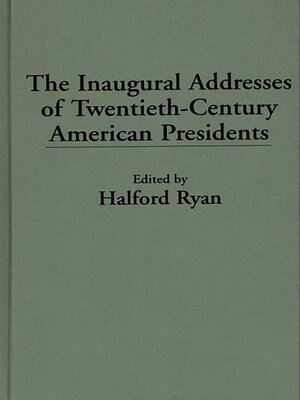The Inaugural Addresses of Twentieth-Century American Presidents
ebook ∣ Praeger Series in Political Communication
By Halford R. Ryan

Sign up to save your library
With an OverDrive account, you can save your favorite libraries for at-a-glance information about availability. Find out more about OverDrive accounts.
Find this title in Libby, the library reading app by OverDrive.



Search for a digital library with this title
Title found at these libraries:
| Library Name | Distance |
|---|---|
| Loading... |
The essays in Halford Ryan's The Inaugrual Addresses of Twentieth-Century American Presidents explore how presidents have used their addresses to empower themselves in office. The volume's construct holds that the president delivers persuasive speeches to move the Congress and the people, and to move the people to move the Congress if it is intransigent. Even on Inauguration Day, a largely ceremonial occasion, the president seeks acquiescence and action from Congress and the people in his first rhetorical deed as the nation's chief executive officer. Since scholars agree that the rhetorical presidency arose in the twentieth century with Theodore Roosevelt, the book commences with Roosevelt's address, followed by all subsequent presidents' inaugurals—including that of Bill Clinton.
The authors' methodology applies classical rhetoric to the nexus of political discourse—the interrelationships between the speaker, the speech, and the audience—discussing vox populi, elocutio, inventio, and actio. Each of the chapters analyzes the political situation with regard to political purpose, giving special attention to genre criticism and to the themes of campaign rhetoric that were or were not carried forth into the inaugural address. The essayists explicate the evolution of each inaugural's preparation, criticize its delivery, and evaluate its persuasive strengths and weaknesses by accounting for its reception by the media and by the American people. Recommended for scholars of political communication and rhetoric, political science, history, and presidential studies.
The authors' methodology applies classical rhetoric to the nexus of political discourse—the interrelationships between the speaker, the speech, and the audience—discussing vox populi, elocutio, inventio, and actio. Each of the chapters analyzes the political situation with regard to political purpose, giving special attention to genre criticism and to the themes of campaign rhetoric that were or were not carried forth into the inaugural address. The essayists explicate the evolution of each inaugural's preparation, criticize its delivery, and evaluate its persuasive strengths and weaknesses by accounting for its reception by the media and by the American people. Recommended for scholars of political communication and rhetoric, political science, history, and presidential studies.







